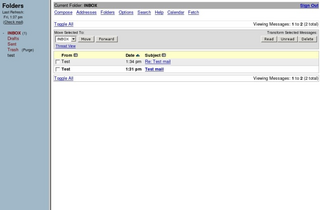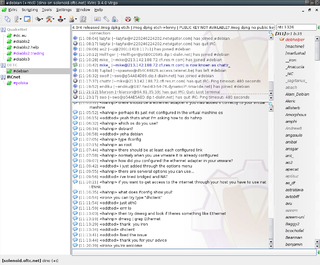
Irssi is an Internet Relay Chat (IRC) client program for Linux, FreeBSD, macOS and Microsoft Windows. It was originally written by Timo Sirainen, and released under the terms of the GNU GPL-2.0-or-later in January 1999.
Darwin is the core Unix-like operating system of macOS, iOS, watchOS, tvOS, iPadOS, audioOS, visionOS, and bridgeOS. It previously existed as an independent open-source operating system, first released by Apple Inc. in 2000. It is composed of code derived from NeXTSTEP, FreeBSD, other BSD operating systems, Mach, and other free software projects' code, as well as code developed by Apple.

Portage is a package management system originally created for and used by Gentoo Linux and also by ChromeOS, Calculate, Sabayon, and Funtoo Linux among others. Portage is based on the concept of ports collections. Gentoo is sometimes referred to as a meta-distribution due to the extreme flexibility of Portage, which makes it operating-system-independent. The Gentoo/Alt project was concerned with using Portage to manage other operating systems, such as BSDs, macOS and Solaris. The most notable of these implementations is the Gentoo/FreeBSD project.

MirOS BSD is a free and open source operating system which started as a fork of OpenBSD 3.1 in August 2002. It was intended to maintain the security of OpenBSD with better support for European localisation. Since then it has also incorporated code from other free BSD descendants, including NetBSD, MicroBSD and FreeBSD. Code from MirOS BSD was also incorporated into ekkoBSD, and when ekkoBSD ceased to exist, artwork, code and developers ended up working on MirOS BSD for a while.
OpenVPN is a virtual private network (VPN) system that implements techniques to create secure point-to-point or site-to-site connections in routed or bridged configurations and remote access facilities. It implements both client and server applications.
These tables provide a comparison of operating systems, of computer devices, as listing general and technical information for a number of widely used and currently available PC or handheld operating systems. The article "Usage share of operating systems" provides a broader, and more general, comparison of operating systems that includes servers, mainframes and supercomputers.

Netatalk is a free, open-source implementation of the Apple Filing Protocol (AFP). It allows Unix-like operating systems to serve as file servers for Macintosh computers running macOS or Classic Mac OS.

SquirrelMail is a project that aims to provide both a web-based email client and a proxy server for the IMAP protocol.

FileZilla is a free and open-source, cross-platform FTP application, consisting of FileZilla Client and FileZilla Server. Clients are available for Windows, Linux, and macOS. Both server and client support FTP and FTPS, while the client can in addition connect to SFTP servers. FileZilla's source code is hosted on SourceForge.
In computer networking, Teredo is a Microsoft transition technology that gives full IPv6 connectivity for IPv6-capable hosts that are on the IPv4 Internet but have no native connection to an IPv6 network. Unlike similar protocols such as 6to4, it can perform its function even from behind network address translation (NAT) devices such as home routers.
The following tables compare general and technical information between a number of notable IRC client programs which have been discussed in independent, reliable prior published sources.

Transmission is a BitTorrent client which features a variety of user interfaces on top of a cross-platform back-end. Transmission is free software licensed under the terms of the GNU General Public License, with parts under the MIT License.

FreeBSD is a free and open-source Unix-like operating system descended from the Berkeley Software Distribution (BSD). The first version of FreeBSD was released in 1993 developed from 386BSD and the current version runs on IA-32, x86-64, ARM, PowerPC and RISC-V processors. The project is supported and promoted by the FreeBSD Foundation.
AICCU was a popular cross-platform utility for automatically configuring an IPv6 tunnel. It is free software available under a BSD license. The utility was originally provided for the SixXS Tunnel Broker but it can also be used by a variety of other tunnel brokers.
Tinc is an open-source, self-routing, mesh networking protocol and software implementation used for compressed and encrypted virtual private networks. It was started in 1998 by Guus Sliepen, Ivo Timmermans, and Wessel Dankers, and released as a GPL-licensed project.
This page is a comparison of notable remote desktop software available for various platforms.

WeeChat is a free and open-source Internet Relay Chat client that is designed to be light and fast. It is released under the terms of the GNU GPL-3.0-or-later and has been developed since 2003.

KVIrc is a graphical IRC client for Linux, Unix, Mac OS and Windows. The name is an acronym of K Visual IRC in which the K stands for a dependency to KDE, which became optional from version 2.0.0. The software is based on the Qt framework and its code is released under a modified GNU General Public License.
This is a comparison of operating systems in regard to their support of the IPv6 protocol.








